|
Applying to college is a tedious and often stressful process for students and their parents. In addition to finishing their last year of high school, teens may also be juggling the SAT or ACT, college tours if available and applications for numerous schools. The Common Application, which is accepted by more than 900 schools, including some colleges located outside the U.S., helps streamline one essential part of the admissions process for students. Through the platform, first-time and transfer applicants alike can apply to multiple colleges at once. So students only have to fill out details that most schools require, including name, address, parental employment and education and extracurricular activities, one time. "The idea behind the Common App is to try and reduce the barriers that students face when applying to college," says Jenny Rickard, president and CEO of The Common Application. Despite its popularity, the Common App may be confusing for some families who are new to the college application process. The guide below can help ease students and parents through the application. When Can I Start Working on My College Application Through the Common App? The new edition of the Common App opens Aug. 1 every year. Updates for this year include the addition of at least 40 new schools, expanded search and filter options, a guided tutorial for users after an account is created, more robust details on colleges including highlighted academic programs, and an optional question for students to explain how the coronavirus has affected their lives as high schools largely went remote in the spring. The optional coronavirus question has a 250-word limit. Students don't have to wait until Aug. 1 to get started on the Common App. They can create an account at any time and transfer their information into the new app when it opens. To start, applicants can go to commonapp.org and click on the "Apply now" button to get details about how to create an account and log in to work on an application through the platform. Students can download the Common App's mobile app to keep track of deadlines, invite recommenders and set reminders. The summer before senior year of high school is a great time for students to start on their applications, experts say. "If you aren't going to be out of town or out of the country with no access to the internet, please start your application Aug. 1," says Marissa Warren, a school counselor at Yorktown High School in New York. Students don't have to submit their applications during the summer. But starting in August gives them the opportunity to review the requirements for schools they're considering, draft essays and get some of the tedious background information completed before they get bogged down with homework and activities, Warren says. Starting early also allows students to get the help they need at the beginning of the school year, she adds. How Long Does It Take to Fill Out an Application? The time it takes to fill out an application varies based on a school's requirements, experts say. However, students need to give themselves at least six weeks to get everything they need for college applications, says Christine Chu, a premier college admissions counselor with IvyWise, an education consulting company based in New York. That's two weeks to fill out any background information and at least a month for other required documents. In addition to any parental information needed – such as employer details and educational background – many schools require first-year applicants to submit recommendation letters and transcripts. Students need to give teachers and counselors enough time to submit those materials to the Common App before deadlines. High school counselors encourage students to ask their teachers for recommendation letters before the end of their junior year so that educators can work on them during the summer. Seniors who need recommendation letters should ask for them early in the school year, experts say. What Are the Common App Essay Prompts, and Where Can I Find Them? The Common App first-year essay prompts for the 2020-2021 school year will be the same as the seven prompts used for 2019-2020. "The current prompts do their job well," the Common App website reads. Applicants have a 650-word limit for essays. The topics vary. A few require students to reflect on their experiences and share examples of learning or personal growth. Students also have the option to share an essay on any topic of their choice or simply describe a topic that captivates them. Applicants can see the essay prompts on the Common App's website. The organization reviews the prompts every other year. With seven options, it doesn't matter which prompt is chosen as long as it's one that allows an applicant to provide insight into his or her identity in ways that aren't reflected in other parts of the application, experts say. "You never want to echo what's in any of those other pieces," says Bonnie Casson-Deweese, director of college match for KIPP Houston Public Schools. She encourages students to look beyond academics to think about what makes them special. For example, being a high school valedictorian when applying to Harvard University isn't notable because just about everybody who applies is at the top of their class, she says. Not all schools require students to submit an essay. Some institutions may require students to submit a supplemental essay or additional information. Applicants can see the requirements for all schools on the Common App when they log in to their student accounts or download a PDF from the Common App's website. Applicants can also preview supplemental questions for schools before they start their applications through the platform's Student Solutions Center. source: usnews.com
0 Comments
Messages from CollegeBoard:
March and May SAT Administrations In response to the rapidly evolving situation around the coronavirus (COVID-19), College Board canceled the May 2, 2020, SAT and SAT Subject Test administration. Makeup exams for the March 14 administration (scheduled for March 28) were also canceled. Students who already registered for May, whose March test centers were closed, or who do not receive March scores because of any irregularities will receive refunds. Future Testing Opportunities We know students are anxious about how the coronavirus crisis will affect their college application process, including taking the SAT. We’re committed to being flexible and innovative to give all students opportunities to test as soon as the situation allows. We’ll share more details as soon as possible, but right now we can tell you the following:
If, unfortunately, schools cannot reopen this fall, we’re pursuing innovative ways to ensure all students can still take the SAT this fall. We’ll provide updates about those plans if they become necessary. Resources and Support To help students keep their college readiness skills sharp when many schools are closed, College Board and Khan Academy® will continue to provide free resources online, including full-length practice tests and personalized learning tools. Together with our member schools and colleges, we will be flexible, thoughtful, and collaborative in exploring ways to continue to support student learning and provide opportunities to test during this challenging time. Our focus will remain on student safety and ensuring students have the tools they need and opportunities to succeed on their path to college. Please check this page regularly for updates. If you have questions or concerns about your scheduled testing with College Board programs, please contact us as soon as possible. Given the high volume of inquiries, wait times may be longer than normal. Educators Email: [email protected] Phone: +1-212-520-8600 Students Email: [email protected] Phone (domestic): 866-756-7346 Phone (international): +1-212-713-7789 Updated Customer Service Hours To better support you throughout this crisis, and in compliance with local, state, and federal safety regulations, College Board's phone support hours are now 9 a.m.—6 p.m. ET, Monday—Friday. National SAT Average ScoreFor the new 2016 SAT, the College Board calculated SAT score percentiles for two groups: all 11th and 12th grade students (Nationally Representative Sample Percentiles) and college-bound students who typically take the SAT for the last time as 11th- or 12th-graders (SAT User Percentiles). For the Nationally Representative Sample, the national average SAT score was:
For college-bound SAT users, the SAT national average score was:
Therefore, if you score above a 1020 on the new SAT, you’re above the national average score on the SAT for all seniors. If you score above a 1080, you’re above the national average for college-bound seniors. Keep in mind that when applying to college, you'll be compared to other students who are also applying, meaning that second average (1083) is the more relevant one. source: Prepscholar
The USA has over 5,000 colleges and universities to choose from. Many schools even offer the same program but with different degrees. For example, at some schools, students can choose from a Bachelor of Arts (BA) in Psychology or a Bachelor of Sciences (BS) in Psychology. What is the difference between a Bachelor of Arts and a Bachelor of Sciences? BACHELOR OF ARTS (BA)A Bachelor of Arts degree offers students a broader education in their major. Students are required to take a variety of liberal art subjects such as humanities, literature, history, social sciences, communications, and a foreign language. Students can select from a diverse list of courses that fulfill each liberal arts requirement. This allows students to actively mold their education to their interests. A BA degree provides a more diverse education in a particular major, therefore, a BA degree generally requires less credits than a BS degree. BACHELOR OF SCIENCES (BS)A Bachelor of Science degree offers students a more specialized education in their major. Generally, a BS degree requires more credits than a BA degree because a BS degree is more focused in the specific major. Students are required to focus on studying their major at a more in-depth level. Students have fewer chances to take classes outside of their major. A BS degree is generally offered in technical and scientific topics like engineering, technology, mathematics, computer science, nursing, and biochemistry. Although a BS degree is generally offered in scientific degrees, many schools offer BS degrees in specialized fields. A Bachelor of Arts and a Bachelor of Sciences are both perceived equally. One is neither better than the other. It strongly depends on whether you’d like to receive a more broader or specialized education in your major. Take some time to learn about each program you are interested so you can make the best decision for yourself. Source: Study in the USA
College Board released a giant 211-page specification for the redesigned SAT, first coming out in Spring of 2016. OVERALL CHANGES IN NEW SATThe College Board has promised that the new SAT test will test skills that are more predictive of success in college and beyond. We find generally that the SAT changes in 2016 accomplish this goal. Greater Emphasis on Reasoning Skills and Context, Not Skills in Isolation Historically the SAT has tested skills in isolation. Vocabulary-based questions would basically evaluate whether the student knew the common definition of that word (like "expropriate"). Writing questions would often test a single grammatical rule in a single sentence. Math questions would test a single math concept for a question of limited scope. Instead, the new SAT emphasizes higher-level logical and reasoning skills. The Reading and Writing questions are now entirely passage-based, giving more opportunities to test a deeper understanding of how the passage is logically constructed and to draw connections between different parts of the passage. The Math section emphasizes more practical, realistic scenarios and introduces multi-step problems. Fewer Learnable "Tricks" The SAT has often been criticized for asking deceptive questions and for using tricks to complicate questions. This meant that students who performed well in school may do poorly on the SAT simply because they were unaccustomed to the presentation of questions. As a result of emphasizing higher-level reasoning, the new SAT features fewer tricks, particularly in the Math and Writing sections. The skills tested are more difficult, but the presentation is more straightforward. Format Changes
|
Blog PurposeWe are happy to share our knowledge and experience in U.S. education, and to exchange ideas with students, parents, and schools. Please feel free to leave comments or questions here.Archives
February 2021
Categories
All
|
Copyright © 2014-2021 All Rights Reserved
Dr. Alex Li Education Services, Hong Kong
Dr. Alex Li Education Services, Hong Kong

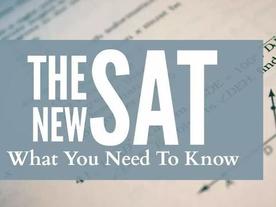
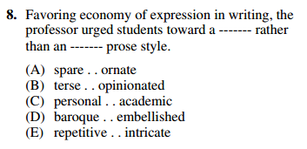
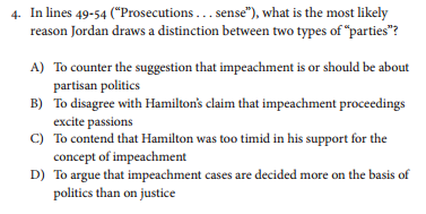
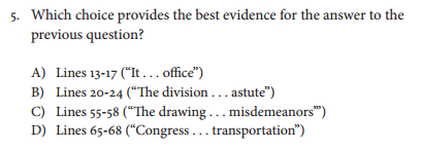
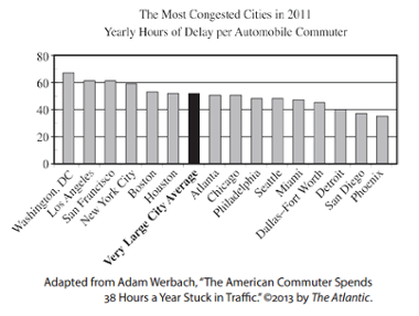
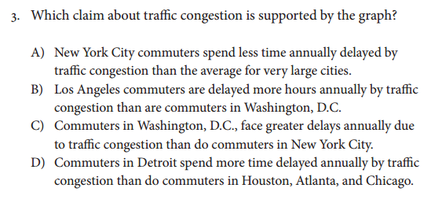
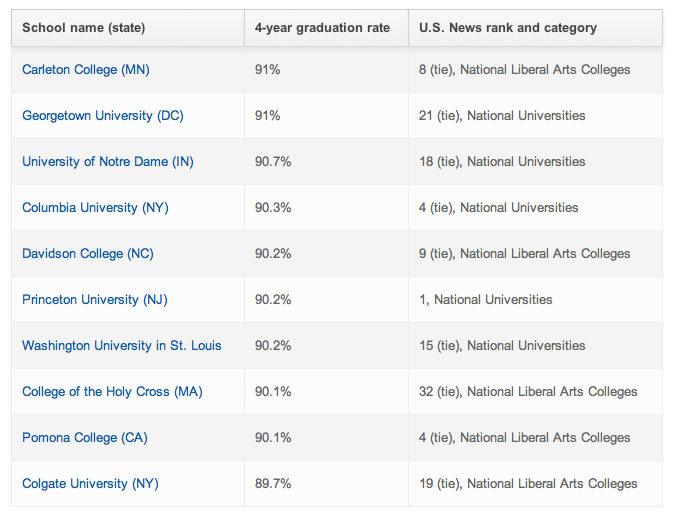

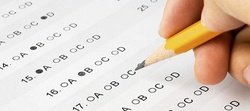





 RSS Feed
RSS Feed